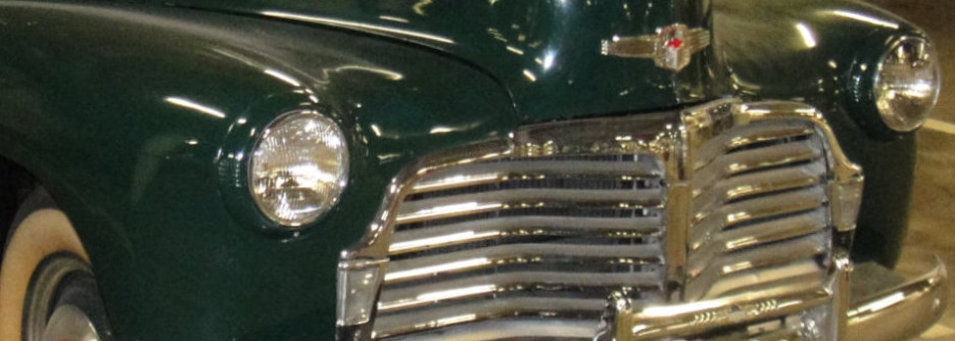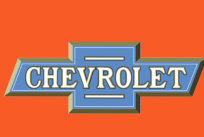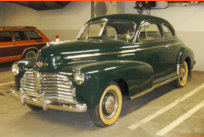












Now were in Business!

Chevrolet Deluxe
Business Coupe
The Chevrolet Deluxe was introduced late in the 1941
model year as a 4-door sedan. In 1942 a fastback 2-door
"aerosedan" became an option.
Production was indefinitely delayed in 1942 due to WWII, after 110,000 had been made total, though several thousand Chevrolet coupes and sedans were produced during the war years
though several thousand Chevrolet coupes and sedans were produced during the war years for military staff use. In late 1945, civilian production resumed. The original series was
for military staff use. In late 1945, civilian production resumed. The original series was produced through 1948. A redesigned Deluxe with reduced body contour and integrated rear
produced through 1948. A redesigned Deluxe with reduced body contour and integrated rear fenders was offered for the 1949 and 1950 years.
fenders was offered for the 1949 and 1950 years.
Specifications
In the 1941/42 model years, the 216cid inline 6 "Blue Flame" engine was the only one offered. It produced 85 horsepower at 3300 rpm. In 1947 output was bumped up to 90
offered. It produced 85 horsepower at 3300 rpm. In 1947 output was bumped up to 90 horsepower. A Deluxe of this vintage could easily exceed 80 miles per hour without overdrive.
The transmission was a manual synchromesh 3 speed, with vacuum assisted shift, in which
horsepower. A Deluxe of this vintage could easily exceed 80 miles per hour without overdrive.
The transmission was a manual synchromesh 3 speed, with vacuum assisted shift, in which the "three-on-the-tree" shifter was able to be moved between gears by the slightest pressure
the "three-on-the-tree" shifter was able to be moved between gears by the slightest pressure on the lever. Third gear was direct, meaning the input and output are equal speeds.
on the lever. Third gear was direct, meaning the input and output are equal speeds. Overdrive was a rare option. Connection to the third member rear-end was via an enclosed
Overdrive was a rare option. Connection to the third member rear-end was via an enclosed "torque tube" driveshaft. The brakes where hydraulic with all-wheel drums. The master
"torque tube" driveshaft. The brakes where hydraulic with all-wheel drums. The master cylinder was located beneath the driver. Shock absorbers were of the lever type. The
cylinder was located beneath the driver. Shock absorbers were of the lever type. The windshield through 1948 was of a split, flat-glass type. The wipers were vacuum actuated.
windshield through 1948 was of a split, flat-glass type. The wipers were vacuum actuated. Chevrolet offered windshield washers on some years.
Chevrolet offered windshield washers on some years.
Style
The exterior sported smooth curves with chrome and stainless trim. The rear bumper had an optional center bumper guard that had to be ratcheted out of the way so the trunk cover
optional center bumper guard that had to be ratcheted out of the way so the trunk cover could be lifted. Front and rear bumpers had optional chrome "tips", a dress-up item that
could be lifted. Front and rear bumpers had optional chrome "tips", a dress-up item that bolted to the ends of the stock bumper. Although it wasn't a Chevrolet option, a popular after
market feature was a large external sunshade that protected the driver from glare off the
bolted to the ends of the stock bumper. Although it wasn't a Chevrolet option, a popular after
market feature was a large external sunshade that protected the driver from glare off the metal dash board.
metal dash board. The interior had cloth bench seats and a metal dash, sometimes with a simulated burl wood
The interior had cloth bench seats and a metal dash, sometimes with a simulated burl wood grain. The radio was a simple mono vacuum tube type radio with integrated speaker. On the
grain. The radio was a simple mono vacuum tube type radio with integrated speaker. On the left side of the radio, there was a knob labeled "T" and it operated the throttle, because
left side of the radio, there was a knob labeled "T" and it operated the throttle, because during startup, it was hard to press both the starter pedal and the accelerator, while keeping
the clutch depressed. On the right side was the choke lever. The clock was integrated into
during startup, it was hard to press both the starter pedal and the accelerator, while keeping
the clutch depressed. On the right side was the choke lever. The clock was integrated into the glove compartment door and was of a manual-wind 7-day type.
the glove compartment door and was of a manual-wind 7-day type.
1941–1948
In 1941, the Master and Special Deluxe had updated styling from the year before with things such as a new grill, new suspension, new curves, and the headlight mounted in the fenders.
such as a new grill, new suspension, new curves, and the headlight mounted in the fenders. The Special had better fabric than the Master, along with arm rests in the doors. There was
The Special had better fabric than the Master, along with arm rests in the doors. There was full instrumentation.
full instrumentation. 1942 models got blackout trim in January. The Signal-Seeking radio became an option. On
1942 models got blackout trim in January. The Signal-Seeking radio became an option. On February 1, 1942, civilian automobile production halted for war production.
February 1, 1942, civilian automobile production halted for war production. When 1946 came along, the names were changed to Stylemaster and Fleetmaster.
When 1946 came along, the names were changed to Stylemaster and Fleetmaster.

1942





Photos mainly by Matti Kreivilä. Historical facts and technical details of the vehicles provided by Wikipedia. Movies YouTube.






